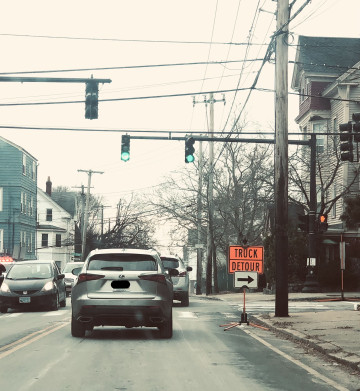Whitcomb: When the Juice Was Fresh; Discouraging Donations; Zip Lines? More Realistic Than Cynical
Sunday, February 04, 2024
“The world is a beautiful place
to be born into
GET THE LATEST BREAKING NEWS HERE -- SIGN UP FOR GOLOCAL FREE DAILY EBLASTif you don’t mind happiness
not always being
so very much fun
if you don’t mind a touch of hell
now and then
just when everything is fine….’’
-- From “The World Is a Beautiful Place,’’ by Lawrence Ferlinghetti (1919-2021), American poet, translator and bookseller.
“The paths of glory at least lead to the grave, but the paths of duty may not get you anywhere.’’
-- James Thurber (1894-1961), American cartoonist, writer, humorist, journalist and playwright.
Psychologists Take on Why People Vote for Trump
“When a society valorises status, money, power and dominance, it is bound to generate frustration. It is mathematically impossible for everyone to be number one. The more the economic elites grab, the more everyone else must lose. Someone must be blamed for the ensuing disappointment. In a culture that worships winners, it can’t be them…. It must be those evil people pursuing a kinder world, in which wealth is distributed…. Those who have developed a strong set of extrinsic {as opposed to intrinsic} values will vote for the person who represents them, the person who has what they want. Trump….’’
About this time of year, when a southern New England winter gets really boring and dreary, some think about Florida, including me.
Parts of my family have been going to Florida since before World War I. My maniacal mother even lived in Miami Beach as a girl from fall to spring before changing demographics (were they anti-Semites?) led them to head up the coast a bit, toward Palm Beach. They were escaping winters in Minnesota, where the money came from.
I was in a relatively poor part of our extended family but was taken to Florida a few times when I was young. Indeed, my first trip gave me my first clear memories. One was being on the beach at the then little-developed Siesta Key, on the Gulf of Mexico near Sarasota, and watching a man throw bread in the air for what I learned later were pelicans. Another memory from the same trip was the smell of the elephant, zebra and horse manure at the Ringling Brothers circus headquarters, in Sarasota. Smell is a powerful jog to memory, as is, of course, music.
When we visited the Florida Gold Coast, from Jupiter down to Miami, I most remember, besides the very painful sunburns, those stands along the smaller roads selling fresh-squeezed orange juice from nearby orchards. Those are now pretty much all gone and replaced by housing developments, office parks and shopping, much of it in the form of strip malls.
A lot of Florida’s landscape and culture are pretty ugly now, and even back decades, I missed our hills when I was down there. I’d hate to live there, but my deep memories remain pleasant. In any case, New England, at least for about eight months a year, is a lot prettier.
And cheer up! This is when our average daily high temperature starts to creep up, in fits and starts, all the way to late July, by which time some of us will have been complaining about the heat for weeks.
Withdrawal
I’d guess that many people of a certain age like the idea of making “a separate peace’’ – of accepting that one can no longer have an impact on the world, of moving from participant to observer and trying to just enjoy each day as best one can, in something like “mindfulness,’’ that trendy concept.
The phrase “a separate peace” is, I suppose, most associated with Ernest Hemingway’s 1929 World War I novel, A Farewell to Arms, and John Knowles’s 1958 boarding-school novel, A Separate Peace, set during World War II. Both at least used to be on many high school reading lists.
Whatever our age, we’d all do well to at least call cease fires from time to time and step back from the world’s crazy churn. Wish everyone good luck in their alarming careers and close the door, maybe for good.
Two of the pleasures of being old: As you lose power and position, you’re increasingly ignored, and you find a growing ease in saying no.
Not in the Giving Vein
Both charitable giving and volunteering are down, as social atomization, economic insecurity and selfishness inspired by some of our political and other leaders rise.
Volunteering for nonprofit organizations has declined to the lowest level since the Census Bureau started keeping track of it, in 2002, with fewer than a quarter of Americans 16 or over formally volunteering for an organization, according to a report in Bloomberg City Lab. You might think that this decline was caused by the pandemic, but in fact it antedates that.
And Americans are giving at the lowest level at least since 1995, says Giving USA, as reported by Axios. They’re now donating only an average of 1.7 percent of their personal disposable income; they contributed 2.2 percent in 2007, the last year it topped 2 percent. (Perhaps not coincidentally, that was the year before the Great Recession started.) There are, of course, different metrics of generosity.
Some of the drop-off was caused by the Trump tax law of 2017, which heavily benefited rich campaign contributors. The law has discouraged giving by people who aren’t rich by raising the standard deduction. This took away a major giving incentive by eliminating the tax advantage, for most people, of itemizing contributions. (But it sure made filling out your tax returns simpler.)
The law, pushed by a man whose main interest in charities was to see how much he could loot the scam ones he set up, also doubled the federal estate-tax exemption to $11 million for single people and $22 million for couples – a good way to discourage tax-avoidance-motivated bequests.
Here's a good description of how Trump’s tax law walloped charities:
(For those 72 or over and lucky enough to have an IRA, one way to get a tax break for your generosity without itemizing is to make a Qualified Charitable Distribution from it. I belatedly discovered this last year.)
At the same time, there’s been a tendency by many of the very rich in our status-obsessed nation to only give money to already very well-endowed nonprofits, such as elite museums and colleges, in order to get their names put up on plaques there for the prestige. Think of the lethal drug-peddling Sackler family. Very worthy and much needier organizations fall by the wayside. Not sexy.
Widening income inequality also plays a role, in making lower-and-middle-income people feel, rightly or not, more economically insecure and thus more fearful of giving away money.
Our social cohesion and shared sense of purpose have been falling for a long time. Robert Putnam famously wrote about this in his book Bowling Alone, in 2000, even before the full assault of social media, which are more precisely anti-social media. People spend more and more time alone as family life erodes and we engage in hours a day of designed-to-be addictive screen staring. This steals interest and time from doing good works in person with other people.
Way before COVID, there was a rapid increase in the number of people working alone, and thus apart from groups of people whose ideas and social energy could encourage volunteering and donations.
I think that the decline in two-way employer-employee loyalty reflects the eroding social cohesion described above. Some of this reflects the desire of most senior corporate executives’ to always prioritize their personal wealth, especially in the company stock they hold, far over their employees’ welfare. Too many believe that the only corporate stakeholders that count are themselves. Of course, we’re all selfish to some degree, and avarice can spur business advances, through new technology, etc., that can improve lives for millions.
America has long been noted for its volunteerism and philanthropic giving, as seen by observers going back to Alexis de Tocqueville in the 1830’s. Can the recent declines be reversed? Damned if I know.
I’ve done some volunteering since I got out of college, though probably should have done more, and have sat on nonprofit organization boards, and even helped to run some nonprofits, including a complicated one now. It can be hard work, and sometimes frustrating, with, on some boards, about 10 percent of the people doing 90 percent of the work. Still, you meet some of the best people America has to offer and you can learn a lot.
Beware if you’re asked to serve on a board. You’ll be expected to give money and to find someone else with more money than you to give to the charity, too. The old line is “Get, give or get off.’’
A Bus Stop Named Desire
I can understand the desire of Rhode Island Public Transit Authority officials to build a spiffy new central bus station in or near downtown Providence for many millions of dollars. But wouldn’t it make more sense to spend those millions in improving the frequency and reliability of bus service? That in turn would grab more regular, fare-paying riders to help address RIPTA’s fiscal woes and improve the service. (But there may be an argument for entirely free RIPTA bus trips because that could boost the local economy by reducing traffic congestion….)
More frequent and reliable bus service is essential to boosting use of public transit – much more important than nicer stations.
I know that the MBTA has had plenty of recent problems in dealing with its huge and complicated system, but it also has lots more expertise than RIPTA. Hire it to take over RIPTA? After all, it already runs trains in Rhode Island.
Take a Joke
For a few years, states have been using quirky messaging on highway signs to grab drivers’ eyeballs. Consider: Massachusetts’s ‘‘Use Yah Blinkah’’ and a sign on Boston’s flood-prone Morrissey Boulevard, “Wicked High Tide.’’
Very cute? Maybe. But what about those people from outside the region who might not understand? Sorry to be a bore, but highway signs, meant to promote safety and smooth traffic, don’t strike me as a good place for whimsy.
The Federal Highway Administration puts it well:
“Messages with obscure or secondary meanings, such as those with popular culture references, unconventional sign legend syntax, or that are intended to be humorous, should not be used as they might be misunderstood or understood only by a limited segment of road users and require greater time to process and understand. Similarly, slogan-type messages and the display of statistical information should not be used.”
xxx
It’s good to hear that moves are underway in the Rhode Island General Assembly to finally make it easier to hold misbehaving police officers more accountable. This would be done by reforming the Law Enforcement Officers’ Bill of Rights, which would be good news for good cops and the reputation of law enforcement in general.
Epidemic of Decay
On the boring, blood-pressure-raising issue of how to transit the Seekonk River in the wake of the closure of the presumably dangerous westbound bridge on Route 195, an email whimsically suggested getting people across via zip lines. And/or catapults. This could draw tourists in warm weather! Snack bars at each end serving such local favorites as calamari and frozen lemonade!
The sick bridge may not prove that Rhode Island’s public works have been worse maintained than most in the country, though that seems to be the case. Incompetence? Underfunding? Sloth? Corruption? A fragrant stew of all of them?
Delayed maintenance of public infrastructure is very much a national problem, especially in places with wet climates and wildly fluctuating temperatures. A big problem is that political leaders don’t want to court unpopularity by asking taxpayers to pay to properly maintain the infrastructure that many use every day.
xxx
Are there lessons for other New England coastal property owners and fisherman in how the storied Maine Coast was devastated by two ferocious storms last month, exacerbated by rising seas caused by global warming, and how they might adapt to our new climate world?
In any case, if you have a cellar, make sure it has a sump pump. Things will keep getting wetter in New England.
Small, ‘Cynical’ and Realistic
The Qatar regime gets slammed for “cynically’’ dealing with Mideast terrorists, lately most notably Hamas, at the same time it deals with Israel and hosts a big American military base. It also has close relations both with Shia Iran and Sunni Saudi Arabia, Iran’s biggest competitor in the region.
But given tiny natural-gas-and-oil-rich Qatar’s size and location, and its internal social fragility – only about 15 percent of its population of an estimated 2 million are Qatari citizens, with most of the rest “guest workers’’ -- the regime must spend much of its time playing off various foreign interests.
By the way, I spent a few days there some years ago working on a charitable project for the Aga Khan University. It’s mostly a big boring sand field with a hyper-modernist capital city, Doha, on the Persian Gulf, or as Arab countries call it, the Arabian Gulf. (When I was an editor at the International Herald Tribune, in the ‘80’s, we carefully/fearfully called it simply “The Gulf.’’ Many in the Arab Mideast, who are mostly Sunni Muslims, have long hated and feared Shia Muslim Iran (Persia).)
One afternoon, I tried to take a walk in Doha. I felt faint after a block or two and returned to the hyper-air-conditioned and very tall hotel. There I discovered it was 122 degrees F and remarkably humid outside. The huge natural gas field offshore provides plenty of fuel to generate enough electricity to cool interiors down to sweater level.
Still, Qatar has opened a big solar-energy plant. It’s looking ahead.
xxx
I receive news about shows in a lot of New England art galleries, whose images I use in my little glorified hobby of a Web site. I’ve noticed since the Black Lives Matter movement, which exploded in 2020, a vast increase in the number of shows by artists who are members of minorities, mostly racial, but also sexual, in numbers far in excess of their percentage of the general population. Anxiously trying to catch up, I guess.

Robert Whitcomb is a veteran editor and writer. Among his jobs, he has served as the finance editor of the International Herald Tribune, in Paris; as a vice president and the editorial-page editor of The Providence Journal; as an editor and writer in New York for The Wall Street Journal, and as a writer for the Boston Herald Traveler (RIP). He has written newspaper and magazine essays and news stories for many years on a very wide range of topics for numerous publications, has edited several books and movie scripts and is the co-author of among other things, Cape Wind.
Related Articles
- Whitcomb: Fall Fish; Lunching With the Prince; Autumn Assault; Classics
- Whitcomb: Soak Up the Extra Water; Death Be Proud; Honestly Facing the Migrant Crisis; Mitt Gives Up
- Whitcomb: More $ Up the Road; Publicly Owned Utilities; Slob Society; Conscription
- Whitcomb: Month of Mock Horror; Zoning Revolution? A Much Bigger Looter
- Whitcomb: Global-Warming Planning; Native-American Street Signs; Israel at War
- Whitcomb: 75 Should Be the Max for Feds; No Pardons; Competition for Amtrak; COVID Camouflage
- Whitcomb: Instant Trouble; Buying ‘Em Out; Charging as You Drive
- Whitcomb: Heartwarming Entertainment in Arctic; Can’t Win on Immigration; Parking Districts
- Whitcomb: Diversify Your Plants; Where to Charge It; Suckers in Sewer; For Fairer Social Security
- Whitcomb: Warm Up the Warming Issue; In Search of Supplies; Home Hell and Comfort
- Whitcomb: “Improvements’ That Turn on Us; Offshore Obfuscations; Seal of Disapproval
- Whitcomb: Metered Metropolis; Will They Kill a Golden Goose? Lawless Migrant Bicyclists
- Whitcomb: Absent Fathers, Absent Students; Less Video, More Historians, Please
- Whitcomb: Drinking Into the New Year; Holiday-Card History Lessons; Revive Counties?
- Whitcomb: Time Sort of Suspended; Don’t Get Trapped; 3 Better Candidates; Plague Years
- Whitcomb: Toxic Status Seeking; Finally Into the Grid! Who Runs Universities?
- Whitcomb: ‘Poor Farmers’ Fertilizer’; Dubious ‘Stars’; Pells and Plumbers; Regressive Taxes
- Whitcomb: Icy Euphoria; Stack ‘Em! Explosive Issue; German Class Divide; Our Writers
- Whitcomb: Price of Delay; Old College Try; What Gazans Think; Canadian Housing; Holy Relic
- Whitcomb: Brief Joys of Snow; Locals vs. the Chains; History Building; Putin’s Congressional Friends
- Whitcomb: Downtowns as Amusement Parks; Quiet!! Office Life; Northeast Corridor Good News
- Whitcomb: Thanksgiving; Bobby’s Business; Foreign News; Beach Day; What Sort of Freedom?
- Whitcomb: Rewilding; Staffing Crisis; Drivers’ Dues; Bonkers in Buenos Aires
- Whitcomb: Maudlin Song Season; Good Local News; Haley and Social Security
- Whitcomb: Pontoon Bridge Needed? Making a Marsh; the Choice They Wanted; Early-Onset Cancer








